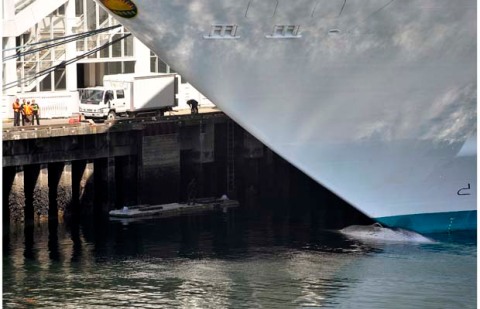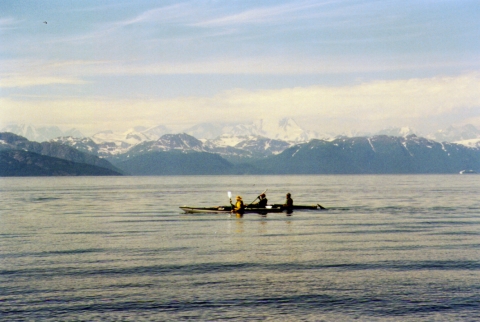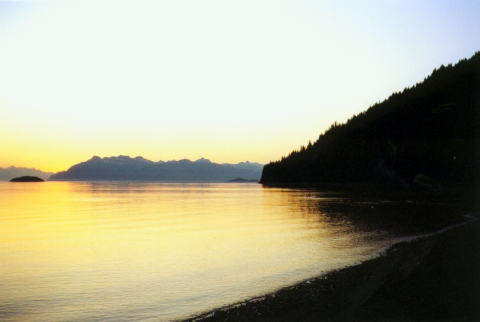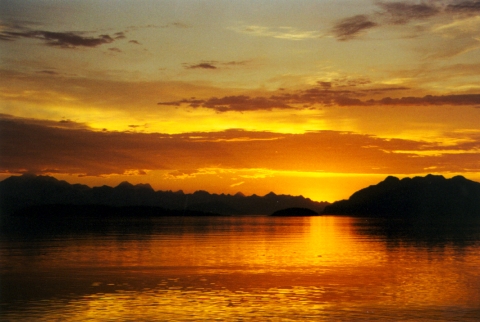A Supposedly Fun Thing That Seems to Kill Whales
I took notice back when David Foster Wallace chronicled the cultural dark side of going on a cruise. But ultimately it’s the environmental dark side of the industry that makes me know I’ll Never Do It at All.
Over the weekend, an adult fin whale — a threatened species in Canada — turned up dead in the waters at a cruise ship terminal in Vancouver. The rare marine giant was impaled on the bow of the “Sapphire Princess,” a Princess Cruises’ ship arriving from Alaska:

(Jenelle Schneider/Vancouver Sun)
Tragic, gruesome and strange — the size of the ship really begins to sink in when you realize that the dead fin whale pictured above is approximately 70 feet long, a magnificent giant cruelly rendered small. (More photos here in the Vancouver Sun’s report, and more here on Flickr.) Consider, also, that soon the 2,670-passenger Sapphire Princess won’t even nearly measure up to the largest, most consumptive recreational beast riding the seas. That’ll be the stupefying Oasis of the Seas.
According to the Vancouver Sun, the Department of Fisheries and Oceans will conduct a necropsy to determine if the ship struck the fin whale while it was alive or if the whale had already been floating dead at sea and got caught on the bow. The latter seems the less likely scenario. A fisheries spokesperson, Lisa Spaven, appeared to acknowledge as much: “Vessel strikes are a very real threat to fin whales,” she told the Sun.
Moreover, an account I heard today from a source in Vancouver appears to contradict a statement put out by Princess Cruises this weekend regarding whales in the vicinity of the ship.
“It is unknown how or when this could have happened, as we have strict whale avoidance procedures in place when our ships are in the vicinity of marine life,” the statement from the cruise company said. “We are not aware that any whales were sighted as the ship sailed through the Inside Passage to Vancouver yesterday.”
But according to my source, two passengers who arrived on the Sapphire Princess in Vancouver this weekend said that several passengers on the ship had seen whales swimming around and under the ship as it traveled the Inside Passage cruise route just north of Vancouver Island.
Spaven, the DFO spokesperson, told the Vancouver Sun that she believes the whale was struck north of Vancouver Island, since fin whales aren’t normally found in the straits closer to Vancouver.
The Inside Passage is famously rich with marine wildlife and is a crucial habitat and migratory route for whales. As the Sun also reports: “This is the second time in the last 10 years that a cruise vessel has come into the Port of Vancouver with a whale caught on the bow. In that instance, in June of 1999, the Celebrity Cruise vessel MV Galaxy collided with an adult male fin whale, which likely happened as the ship transited the Hecate Strait north of Vancouver Island.”
For some compelling related reading, I strongly recommend Charles Siebert’s article “Watching Whales Watching Us,” published recently in the New York Times Magazine. It’s a deep, enthralling account that dives into some provocative thinking among marine biologists today about our evolving relationship with whales — which may yet hold hope, despite our terrible history of assault on one of the earth’s most sublime creatures.
PART 2:
There is more to Princess Cruises’ history with whales. In the summer of 2001, one of its ships slammed into a pregnant female humpback whale in the waters off Southeast Alaska, killing it. As Mother Jones reported two years ago via a National Park Service report, in January 2007 “Princess Cruise Lines pled guilty in U.S. District Court in Anchorage to a charge of knowingly failing to operate its vessel, the Dawn Princess, at a slow, safe speed in the summer of 2001 while near two humpback whales in the area of Glacier Bay National Park. The bloated carcass of a pregnant whale was found four days after the Princess ship sailed through the park. It had died of massive blunt trauma injuries to the right side of the head, including a fractured skull, eye socket and cervical vertebrae, all consistent with a vessel collision.”
You can read the rest of the report at the MoJo link above, including details of the six-figure penalty paid by Princess in a plea agreement. At the time of the agreement, the U.S. attorney’s office stated, “in this case we feel Princess has stepped up and made significant, voluntary operational changes that protect whales and the marine environment.”
Pending findings on the Sapphire Princess and the fin whale’s death, perhaps that assessment needs updating.
I’m compelled to add that I feel a particularly personal sense of investment in this story. Exactly a decade ago, I was fortunate to have an opportunity to travel into Glacier Bay, along with three good friends, on a 10-day sea kayaking trip. I’ve explored deep wilderness throughout my life, and Glacier Bay was among the most memorable places I’ve ever been. On a couple of days during the trip, we spotted cruise ships on the horizon. We were thankful to be far away from them. In this photo I took from my sea kayak in July 1999, you can see a large cruise ship in the distance (at the right-center edge of the image) heading north against the backdrop of the Fairweather Range.

We camped on nearby shoreline that night, where an exquisite sunset perhaps hinted at what was to come on day nine of our trip.


The next morning we paddled into the placid waters of Beartrack Cove to the east. We were sole representatives of humanity in a place that sees little of it. There were colorful marine birds, salmon returning to spawn in coastal streams… and suddenly that morning, one enormous humpback whale. It surfaced about 30 yards in front of our tiny, tiny boats.
The whale appeared to be feeding, its dark mass breaking the surface several times with its huge mouth open. We stopped paddling and tapped the rails of our boats gently to let it know our location. We watched in awe as it reappeared around us at various spots in the cove for about half an hour before it submerged for other waters.
It was the most glorious kind of nervous I think I’ve ever felt, a truly unforgettable experience.
plase save marine animals
plase protect marine environment
Please save the world
please save the humanity
please save our environment
Dr. Amr M. Nasef
PH.D in Marine Ecology
Cairo – Egypt